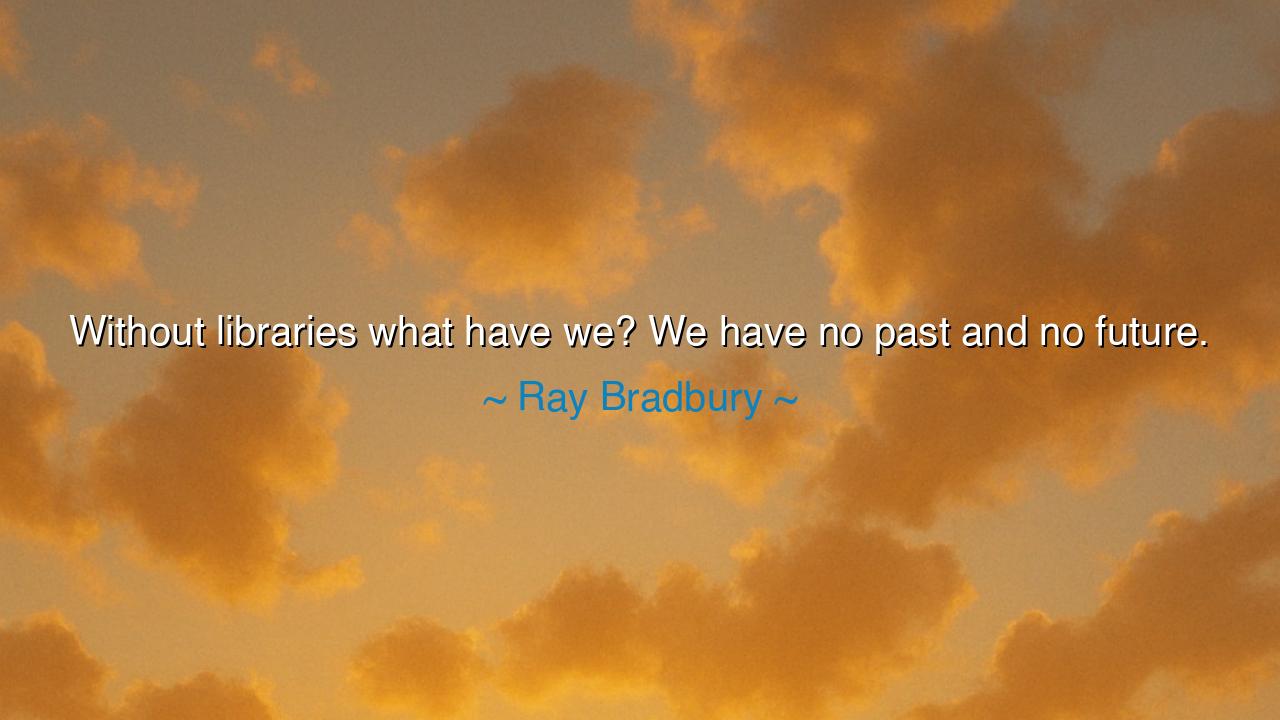
Without libraries what have we? We have no past and no future.






The immortal dreamer and master of words, Ray Bradbury, once proclaimed: “Without libraries what have we? We have no past and no future.” In these few words lies a truth vast as the sea and ancient as civilization itself. For the library is not merely a house of books — it is the temple of memory, the storehouse of human thought, the living bridge between what was and what may yet be. When Bradbury spoke these words, he was not merely defending books from neglect, but defending humanity from forgetfulness. For when a people lose their stories, they lose their soul; and when they lose their soul, they lose their way forward.
In the manner of the ancients, let us see what wisdom lies within this saying. When Bradbury says that without libraries we have no past, he reminds us that knowledge is the thread that ties one generation to the next. The library is the memory of humankind — a mirror reflecting not only our triumphs but our failures, not only our wisdom but our folly. Within its shelves lie the whispers of philosophers, poets, scientists, and wanderers long gone, who left behind the only immortality mortals may claim: their words. To walk through a library is to walk through time; to open a book is to speak with the dead. Without this sacred dialogue, history dissolves into dust, and each new generation is left to stumble blind through the mistakes of its ancestors.
Yet Bradbury also warns that without libraries, we have no future. For a future cannot be built upon ignorance; it must be shaped by the lessons of the past and the imagination of the present. Libraries are not tombs for old thoughts — they are gardens where new ones take root. Within their quiet halls, a child may dream of distant galaxies, a thinker may question what has always been, and a leader may find the wisdom to govern justly. The library is both seed and soil — a place where ideas grow, and through those ideas, the world itself evolves. To lose it is to sever the roots of progress and silence the voice of possibility.
The origin of Bradbury’s devotion to libraries can be found in his own life. Born to poverty, he could not afford college; instead, he educated himself in the public library. He once said that he graduated from “the library school of life.” It was there that he discovered the magic of books — and it was in defense of those same sanctuaries that he later wrote Fahrenheit 451, a warning against a future where knowledge is burned and curiosity is outlawed. To Bradbury, the destruction of books was not the loss of paper and ink, but the death of thought, the erasure of everything that makes us human. His words are not only praise — they are prophecy.
History, too, bears witness to this truth. When the Library of Alexandria burned, the light of centuries was extinguished. Scrolls containing the discoveries of philosophers, astronomers, and poets were turned to ash, and with them vanished knowledge that might have advanced civilization by millennia. Humanity was plunged into darkness, forced to rebuild what it once knew. Yet in every age, the flame of learning rises again — in monasteries, in universities, in the humble public libraries of towns and cities. Each generation must guard that flame anew, lest ignorance once more cast its shadow over the world.
O children of tomorrow, heed this teaching: the library is the heartbeat of civilization. It is the one place where all voices may speak — the rich and the poor, the ancient and the unborn. When you enter a library, you enter the great conversation of humankind. Do not take it for granted. Cherish it. Defend it. Read not only to learn, but to remember; not only to imagine, but to understand. Every book you open keeps alive a spark of the world’s soul, and every library you preserve becomes a fortress against forgetting.
And so, let Bradbury’s words echo through the ages: “Without libraries, we have no past and no future.” The past gives us wisdom; the future gives us hope — and the library is the sacred vessel that carries both. Visit its halls. Fill them with laughter, curiosity, and wonder. Share its treasures with those who do not yet know their worth. For when you protect a library, you protect the story of humanity itself. And when you step into its light, you do not merely read — you remember, dream, and become.






AAdministratorAdministrator
Welcome, honored guests. Please leave a comment, we will respond soon